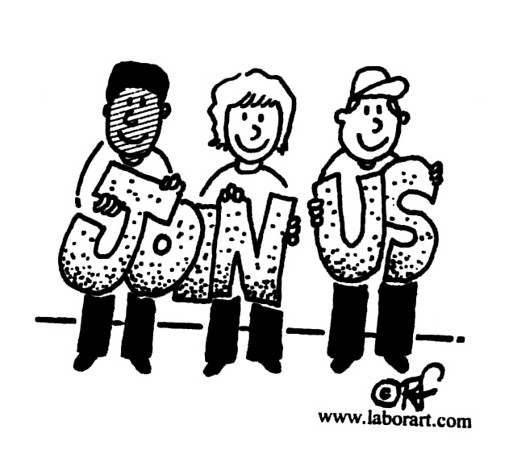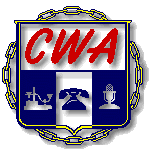
Why Should I Join the Union?
Collective Bargaining is a power relationship, and the Union gets its power from its members' solidarity and active support. The employer knows precisely how many non-members are in the bargaining unit and takes the number of non-members as a sign of weakness, which they will exploit. Without membership support and activism, the power shifts unfairly toward the employer, and the collective bargaining process breaks down.
I can't afford to join the Local because the dues are too high:
Each local member shall pay dues at 2 1/4 hours per month. This amount is usually broken up between two pay periods, roughly 1 hour and 7 minutes a paycheck. (Click here for more information)Over 60% of the dues are returned to the Local to provide the resources for the Union to fight to protect our jobs, living standards, and quality of life. The other 40% is used to invest in the CWA National Defense and Relief fund, which assists members in times of Strikes and pays for the operation of the International Union. Companies spend billions of dollars paying management salaries to protect their interest, so we, as members, should do our part to protect ours.

I don't like how things are run by the Union or the people who are running it:
Your signature on a membership card gives you the right and the opportunity to help run the Union. The union leadership and stewards are workers like you who volunteer their time to represent your interest and objections to management. Suppose you feel the administration or a steward is not running the local correctly. In that case, you must bring these issues before the membership so that the Union is run in a fashion that meets the membership's needs.
Why do I need a Union when the company treats me fairly, and the Union has never received anything that we wouldn't have received anyway?
Management has to treat you fairly because the union contract requires them to. They must use seniority and overtime rosters for shift selection, vacation scheduling, and volunteer overtime. If management were not held to an agreement like this, chances are only certain workers would be used for special projects and used for overtime all the time. In a non-union shop, management is all-powerful, and management usually lets everyone know about it. You have no voice in a non-union shop.
I can't afford to go on strike, so how can I be sure I won't be out on strike?
It is up to the membership to decide whether we go on strike. If you are not a member, you have no say in what the Union does. Strikes lose less than one-fifth of one percent of all working time. You usually read in newspapers and see on T.V. about strikes because, of course, strikes are news. How often have you heard about the hundreds of thousands of contracts settled without a strike? A strike is a leverage tool to equalize the power of the two parties (Union and management). Collective Bargaining works best when both parties have the incentive to settle.
My boss doesn't believe in unions?
At one time, the supervisor was a virtual dictator able to hire and fire at will. Now he has to live up to the contract agreed upon. The NLRA, the agreement, and public policy guarantee you the right to organize, even in a right-to-work state.
I don't want anything to do with the Union. I feel they are all corrupt:
The CWA is a democratic, clean union that has a strong tradition of grassroots Local leadership. The CWA Constitution assures democratic procedures and that the membership controls the Union, not the administration. As a member, you have the right and obligation to point out abuse to the membership at any time. Corruption on any level will not be tolerated.




